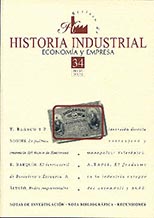Fordism in the european car industry and SEAT (1950-1970)
Keywords:
Car Industry, Fordism, SEAT, FIATAbstract
This article deals with the transfer of the work rationalization criteria in Spain between 1950 and 1970, using the case of the company Seat. The continuous revision of the productive technology, imposed by Fiat, allowed Seat to achieve a large-scale economical activity and a good position in Europe. However, at the end of the sixties, Seat suffered the same organizational problems than Fiat, company from which it depended. In front of the productivity dilemma, the productive system became excessively rigid to face an increasingly diversified demand. In addition, the rise in the work pace and the difficult labour conditions lead not only to the consequences of the Ford system but also to the breeding ground for labour troubles that, together with other factors, contributed to the withdrawal of Seat by Fiat in 1980.Downloads
Published
How to Cite
Issue
Section
License
We have been applying a Creative Commons Attribution license (CC-BY) since 2019, before that year we had a partial open access policy, which included open access for the first two months after publication, followed by an embargo policy for non-subscribers, as access to the last 4 published issues was restricted to journal subscribers. In contrast, early-view articles were always open access prior to publication in an assigned volume. Until 2024 the access to the last 4 published numbers was restricted to those who were subscripted to the journal.
The author assigns all rights to the publisher. Creative Commons
The author who publishes in this journal agrees to the following terms:
- The author assigns all intellectual property rights exclusively to the publisher for the entire duration of the applicable intellectual property rights.
- The publisher will distribute the texts under the Creative Commons Attribution License, which allows others to share the work, provided that they acknowledge the authorship, its initial publication in this journal, and the conditions of the license.





